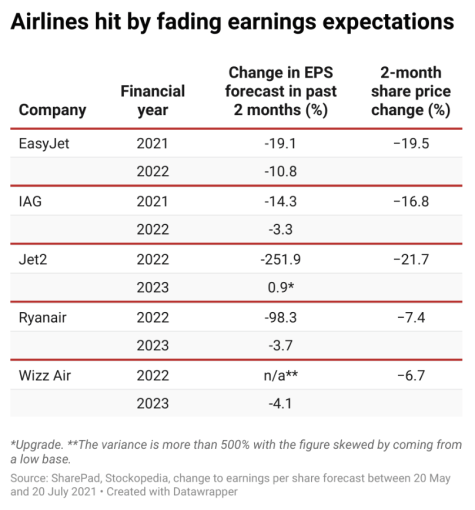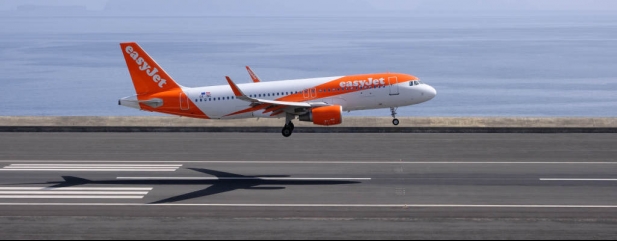Shares in the main UK-listed airlines have fallen by 14% on average in the past two months as analysts continue to downgrade their earnings forecasts for the sector.
Airlines had hoped for a big rebound in activity during the summer as Covid-related restrictions are lifted and more people are vaccinated and ready to travel once more.
Unfortunately, confusing messages from the UK Government over which countries you can visit without isolation upon return, together with a surge in the number of people catching Covid have cast a dark cloud over the airline sector’s chances of having a profitable summer.
‘Traffic may have reached an inflection point, but financial and cash flow inflections are yet to come,’ says stockbroker Davy.
Airlines are having to contend with cost pressures including fuel and maintenance, while those consumers willing to fly are having to stomach testing-related costs and airport delays – these latter two factors might be enough to put a lot of people off travelling.

EasyJet (EZJ) said on 20 July that customers in Continental Europe now accounted for two thirds of its summer bookings versus 50% historically. It has even shifted some of its Greek-destined routes to take off from EU and Swiss hubs rather than the UK.
According to consensus data from Stockopedia, analysts have cut forecasts for EasyJet’s current financial year by nearly 20% over the past two months, either illustrating waning confidence in near-term trading or an admission that forecasts were simply too high in the first place. Estimates for the year to September 2022 have also been slashed by approximately 11%.
Wizz Air (WIZZ) had been forecast to essentially break even for the year to March 2022 and now analyst forecast a €0.94 per share loss. Two months ago, Jet2 (JET2:AIM) was expected to make 22p loss per share in its current financial year to March 2022, now that estimate has widened to 77.4p per share.
The next few months could be very difficult for the UK airlines, yet some investors may wish to look at other territories for brighter signs in the broader sector. Air travel in the US recovered to pre-pandemic levels over the 4 July Independence Day weekend. In June, United Airlines placed an order for 270 jets, the biggest in the airline’s history, as it gambles on a resurgence in premium travel.
‹ Previous2021-07-22Next ›

 magazine
magazine









